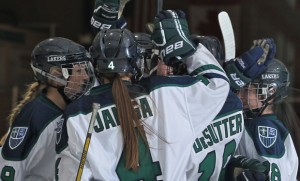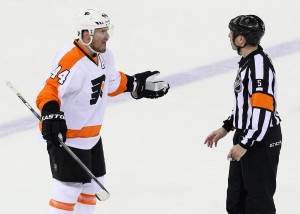Think about the years you spent in minor hockey. And if you never had the privilege of playing hockey as a child, picture an ordinary kid with a love for the game.
The passion, desire and reward that child possesses is only made possible by Mom and Dad.
While the sleepy-eyed youngster is being persuaded out of their cozy twin-sized race car bed at 5:30 a.m., Mom is making breakfast and Dad already has the gear packed and in the car. They’ve been up since 5.
A road trip from Montreal to Toronto for a weekend tournament is the pinnacle of any kid’s season. Friday off from school, mini sticks in the halls of the hotel and dining out for every meal with the entire team; it doesn’t get much better than that. But to achieve this, Mom and Dad had to both use one of their vacation days at work, drive over 12 hours there and back, all the while leaving their wallets open for three long days.
Behind every fulfilled minor hockey career, there are the parents who have made it all possible.
It’s not easy – quite the opposite, actually. Becoming a devoted, admirable hockey parent is time consuming and just plain difficult. But it’s essential in creating a satisfying minor hockey experience.
Push, Don’t Force

Kids will seldom take their own agendas upon themselves at an early age. They won’t realize they like or don’t like hockey if you don’t press them to try it. Like most things in childhood – anything from a new meatloaf recipe to jumping off the higher diving board – the first foot forward usually needs to be one of a parent.
Parents always have the right to push their kids in a positive way to try something new, but the kid must always have the right to make the final decision. With hockey, the same rules apply.
You want to enrol your kid in hockey at age five? Sure, but you shouldn’t force them to stay if they absolutely loathe it after the first month.
You want your kid to see if they would enjoy playing competitive? Very understandable, but if they try out and find it too rough, there’s no stopping them from having fun in house league.
You think your kid has potential and should be taking the game more seriously? Yeah, why not? Put them in hockey camp for a week in the summer, but if they don’t want to be that committed, then hockey camps are off the table and water parks might be a better summer solution.
One of the most unacceptable things a hockey parent can do is live vicariously through their child. It’s a cliché, but there’s one case on every team.
Recreational hockey (beer league) on the side of a stable full-time job isn’t the worst thing in life. You can be a high school history teacher and still love to play the game on Wednesday nights at 11 p.m.
Referees
Before you verbally abuse an official for a poor call on your team’s behalf, let’s just examine a few things.
Booing and heckling a referee in the NHL is acceptable, heck, it’s even thoroughly encouraged. The officials understand that the NHL is ultimately part of the entertainment business. But, harassing a minor hockey ref? That’s not exactly warranted.
While an NHL referee makes a six-figure salary, the minor hockey official will earn around $20 a night. That’s hardly worth the uneducated criticism from rowdy parents.

The average age for an NHL referee is around 45-years-old. In minor hockey, depending on the level of play, officials can be as young as 12-years-old, but a good chunk range from ages 16-18. For a lot of young minor hockey referees, this is their first job. They’re probably trying to earn a few bucks, maybe even saving up for college along the way.
In a lot of scenarios, the official lacking a decent grasp of the rulebook at your kid’s game may very well be near your kid’s age. If so, it’s easy to understand why yelling obscenities towards them is quite outrageous.
Without even taking consideration for the referee’s age, pay cheque or overall well-being, just ponder who you’re giving your attention to. Your kid doesn’t want you focusing on the referee’s decisions more than their play on the ice. And yes, they notice.
So are you really going to spend your Tuesday night in a cold arena taunting a 16-year-old?
You’d be surprised how many people do.
Interacting With the Coach
You are not your kid’s agent. They don’t need more ice time and they don’t need that captaincy you’ve been lobbying for.
The coach, if you’re not playing a high level of competitive, is likely just another parent on the team. They’re volunteering to teach and look over a dozen kids three times a week. In your head, they might be the mastermind behind the team’s success and your kid’s future as a hockey superstar, but really, they’re sacrificing their own free time to plan practices so they can keep everyone engaged for an hour. If you’re lucky, the coach hopefully bestows some know-how upon your kid and maybe they’ll also learn a few valuable lessons that can influence them off the ice.
And don’t be worried about the coach’s kid getting more playing time than yours. Though politics might be present in minor hockey, the impact is also exaggerated and not worth getting caught up in.
Keep the Peace
First off, don’t be this guy.
Paul, nooooooooo http://t.co/FA5q4fEYEM (Vine: @PeteBlackburn) https://t.co/HsIf22pP50
— SB Nation (@SBNation) January 22, 2015
You have two questions to ask yourself: Would I do this in a grocery store or movie theatre? How do I think my child is feeling while watching me?
We’ve all seen it first hand. The frustration boils over, cooler heads fail to prevail and someone in the stands loses their mind. Parent fights are no myth, but they are a tragedy.
There’s a choice to make every single game. Either sit close to the other team’s parents and play nice, or stay off to the side making it easier to refrain from getting in a silly argument over if that last penalty call was actually a slash or not.
The best parents in the stands support their team and respect the opposition at the same time.
***
So get up early, scrape off the ice on the windshield and never take your eyes off your 5-year-old at those Saturday morning practices. Urge them to explore what kind of commitment they want to make as they grow up in the sport, but always make sure to realize when they’ve made their decision. Be civil with everyone in the arena, whether or not they’re wearing stripes, and for God’s sake bring a blanket. You have no idea how cold it can get in some of these rinks.
But most of all, think of what you want your kid to take away from their minor hockey career when they step off that ice for the final time.
It’s just a game, but you can make it mean so much more.